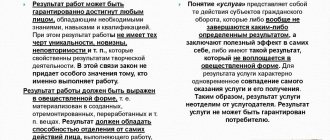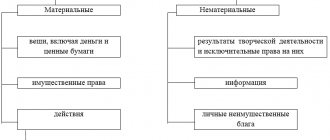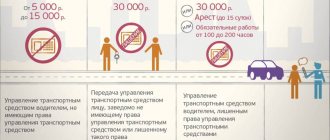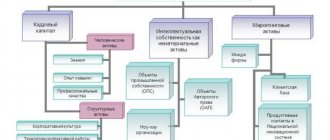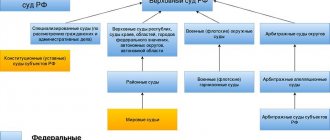New edition of Art. 128 Civil Code of the Russian Federation
Objects of civil rights include things (including cash and documentary securities), other property, including property rights (including non-cash funds, uncertificated securities, digital rights); results of work and provision of services; protected results of intellectual activity and means of individualization equivalent to them (intellectual property); intangible benefits.
The concept of property in civil law
Despite the fact that there is no legal definition of the term “property” in civil law, one can judge its content by analyzing the provisions of Art. 128 Civil Code of the Russian Federation.
Property is tangible and intangible objects of civil rights, which, as a general rule, can be alienated and transferred from one person to another (Article 128, paragraph 1 of Article 129 of the Civil Code of the Russian Federation).
The Constitutional Court of the Russian Federation clarified that the term “ property ” covers any property associated with the implementation of the right of private and other forms of ownership, including property rights , including the rights of ownership, use and disposal of property received from the owner (Resolution of the Constitutional Court of the Russian Federation dated 06.06.2000 N 9-P).
Another Resolution of the Constitutional Court of the Russian Federation stated that the concept of “ property ” in its constitutional and legal sense covers, in particular, real rights and rights of claim belonging to creditors (Resolution of the Constitutional Court of the Russian Federation of May 16, 2000 N 8-P).
6) Fruits, products and income
Fruits, products, income received as a result of using a thing, regardless of who uses such a thing, belong to the owner of the thing , unless otherwise provided by law, other legal acts, contract or follows from the essence of the relationship (Article 136 of the Civil Code of the Russian Federation). So, for example, in accordance with Art. 606 of the Civil Code of the Russian Federation, the fruits, products and income received by the lessee as a result of the use of leased property in accordance with the agreement are his property.
Things also include materialized income from the use of other (basic) things:
- fruits are products of the organic development of a thing, separated from it as new things without significantly changing it and serving as objects of civil legal relations (for example, milk from a cow, wool from a sheep, eggs from poultry, fruits of fruit trees, as well as offspring, i.e. . offspring from productive livestock, fur-bearing animals in nurseries, etc.);
- products - increments obtained as a result of processing or processing of raw materials (for example, light industry products manufactured on leased equipment, etc.). In other words, products are everything that is obtained as a result of the productive use of a thing.
- income - cash and other economic income (for example, economic benefit received as a result of the free use of someone else's thing, etc.). In other words, income represents an economic increase in the form of cash or other receipts from persons using the thing. Income, in particular, includes rent, interest on deposits, etc.
The objects of civil rights under consideration appear from the moment of their “separation” from the used (main) thing and are of an independent nature.
As stated above, the rule of Article 136 of the Civil Code of the Russian Federation, which establishes that all listed proceeds from a thing, as a general rule, belong to its owner, is dispositive in nature and can be changed by law, other legal acts or agreement; something else may also follow from the essence of the relationship between the owner of a thing and its user.
The relationship between the concepts of “thing” and “property”
The concepts of “thing” and “property” overlap in many ways and coincide, since property is primarily objects of the material world that have some materialized form, i.e. things. However, the term “property” is somewhat broader in scope , since, in particular, it covers, along with the concept of “thing,” the concept of “property rights”.
The term “property” has many meanings: it includes not only things and property rights, but in some cases also property obligations (for example, in inheritance). For the meaning of the term “property” in the Civil Code of the Russian Federation, see below.
The practical value of classifying property rights as property is that they (the rights) can also be the subject of transactions . For example, a citizen owns a car and wants to sell it. Another citizen has already transferred the car under a purchase and sale agreement, but has not yet received payment for it. In the first case, a citizen can sell his car (thing) and get money for it. In the second case, a citizen can also, in fact, sell to a third party his rights of claim against the buyer for payment of funds for an already sold car (i.e., transfer the rights of claim under an assignment of rights agreement). In the first case, the subject of the transaction is a thing (a car), in the second - a property right (right of claim) under a contract for the sale of a car.
The subject of the transaction can be not only liability rights, as in the example above, but also proprietary rights, exclusive rights and some corporate rights, which will be discussed in more detail below.
Another comment on Art. 128 Civil Code of the Russian Federation
Things are understood as objects of the material world created by both man and nature that satisfy certain human needs. A special type of thing is money (see commentary to Article 140) and securities (see commentary to Chapter 7).
The property rights referred to in the commented article are understood as rights of claim (arising from membership in business companies and partnerships, production cooperatives, stock exchange transactions, securities, etc.).
The difference between works and services as objects of civil rights is that in the first case, the result of the actions performed is the creation of some material result (for example, the construction of a house under a contract), whereas in the provision of a service such a result may not exist (for example , provision of consulting services). Services can be divided into actual (transportation), legal (transactions under a commission agreement), complex, i.e. including legal and actual actions (transport expedition agreement). Works and services are objects of obligatory relations that mediate property relations in dynamics.
The identification of information as an independent object of civil law is due not only to its national significance, commercial value and turnover, but also to the need to protect it as an intangible, freely distributed and easily accessible benefit necessary for a person in his life and activities. In this regard, information as an object of civil law regulation should be understood as any knowledge, information or data about something or someone that objectively exists, is stored and transmitted (see commentary to Article 139).
For the results of intellectual activity, see the commentary to Art. 138. Regulation of intangible benefits contains Ch. 8 (see comments to it).
3.1.Things
1) Things are the main component of property - it is through things that the bulk of the subjects’ needs are satisfied. Things are material objects that have any property value (usually in monetary terms), including movable and immovable property.
Things in civil law are classified into the following types :
- things allowed in circulation, restricted in circulation and withdrawn from circulation
- movable and immovable things
- divisible and indivisible things
- simple and complex things
- main thing and accessory
- fruits, products and income
- things that are individually defined and things that are defined by generic characteristics
- animate and inanimate things
- consumable and non-consumable things
- existing and future things
For more information about each type of thing, see the article “A thing in the Civil Code of the Russian Federation and civil law is ... Types of things, classification”
By virtue of the direct instructions of the law (Article 128 of the Civil Code of the Russian Federation), things also include:
cash is a universal thing that is a universal equivalent and can be used as a universal means of payment. Cash refers to banknotes: banknotes (banknotes) and coins, which are unconditional obligations of the Bank of Russia and are secured by all its assets. Banknotes refer to things defined by generic characteristics and are replaceable things. However, unlike other fungible things, they are determined not by the number of individual bills, but by the monetary units they contain. Cash in rubles is legal tender and must be accepted at face value throughout Russia (Clause 1, Article 140 of the Civil Code of the Russian Federation). Cash in foreign currency can be a means of payment for settlements on the territory of Russia only in cases, in the manner and under the conditions determined by law or in the manner established by it (clause 2 of Article 140, clause 3 of Article 317 of the Civil Code of the Russian Federation).
certificated securities . Documentary securities are understood as documents that comply with the requirements established by law and certify obligations and other rights, the exercise or transfer of which is possible only upon presentation of such documents (Article 142 of the Civil Code of the Russian Federation). Securities include shares, a bill of exchange, a mortgage, an investment unit of a mutual investment fund, a bill of lading, a bond, a check and other securities named as such in the law or recognized as such in the manner prescribed by law.
A documentary security itself may be the object of real rights (for example, property rights, etc.).
A documentary security belongs to the category of movable things and can certify property (for example, the right to dividends) and non-property rights (such as the right to participate in the management of a joint-stock company, etc.).
The property that distinguishes a security (as a set of rights enshrined in it) from ordinary obligatory legal relations between creditors and debtors is the “ negotiability” of a security as a thing, including its ability to be the subject of civil transactions.
Money as an object of civil legal relations
A special category of objects of civil legal relations is money.
Only money has the property of being a universal means of accounting. Liabilities and assets of business entities are described exclusively in monetary terms.
The solvency of a sum of money is determined not by the properties of the materials used to make banknotes or coins, not by their weight or quantity, but solely by the number of monetary units.
In civil law, money can be used to pay off almost any property debt. Moreover, money is also used in non-property relations to compensate for the infringement of intangible benefits.
Along with this, in some types of legal relations money does not act as an equivalent to the value of the alienated good, but as an independent object (loan).
For monetary obligations, the opposite rule applies to determining the place of execution - not at the place of residence of the debtor, but at the place of residence of the creditor.
For failure to fulfill monetary obligations, specific liability is established - interest is always accrued first, and losses are recovered only when they are not covered by interest.
Money, unlike other things, can never be vindicated from a bona fide purchaser.
The uniqueness of money is also determined by its dual legal nature. On the one hand, cash is generic and divisible. The monetary obligation to hand over cash is properly fulfilled by simply handing over notes and coins. On the other hand, the Civil Code does not recognize non-cash funds as things, but classifies them in the category of other property.
In legal theory, non-cash money is generally recognized as a type of property rights. These rights are taken into account by special entities, most often banks, in customer accounts.
Cashless payment is not the transfer of things, but the debiting of funds from the payer’s account and crediting them to the recipient’s account.
Other types of money are national and foreign currencies. The official currency of Russia is the ruble. It is considered legal tender. This means that monetary obligations must be expressed in rubles. The currency of the obligation may still be foreign (with the condition of payment of the corresponding amount in rubles), but the currency of payment is always only rubles. You can pay in the Russian Federation with foreign money only if there is some foreign element (settlements with non-residents, payment for goods abroad, etc.). This is prohibited for ordinary citizens and legal entities in their daily activities.
3.2. Property rights
In civil legislation, property rights are understood as the rights of participants in civil legal relations related to their exercise of powers to own, use and dispose of property, as well as property claims that arise between participants in civil transactions regarding the determination of the fate of property and related rights. Property rights include:
real rights . The object of real rights is an individually defined thing, i.e. a thing that has special properties inherent only to it. In accordance with paragraph 1 of Art. 216 of the Civil Code of the Russian Federation, real rights along with the right of ownership, in particular, are: the right of lifelong inheritable ownership of a land plot (Article 265 of the Civil Code); the right to permanent (indefinite) use of a land plot (Article 268 of the Civil Code); easements (Articles 274, 277 of the Civil Code); the right of economic management of property (Article 294 of the Civil Code) and the right of operational management of property (Article 296 of the Civil Code);
rights of obligation (rights of claim). Rights of obligation allow the creditor to demand that the debtor perform a certain action or refrain from performing it. Such rights are also called claim rights. As a rule, rights of obligations arise from contracts and other transactions, but they can also arise between persons not related to each other by any contracts or agreements (clause 2 of Article 307 of the Civil Code of the Russian Federation). Thus, a person bears tort liability for causing harm (Article 1064 of the Civil Code of the Russian Federation), and unjust enrichment is subject to return according to the rules of Art. Art. 1102 – 1109 Civil Code of the Russian Federation;
exclusive rights . Exclusive are the rights to intellectual property, that is, to the results of intellectual activity or equivalent means of individualization of legal entities (their goods, works, services, etc.). Exclusive rights are similar to real rights, however, unlike the latter, they arise on intangible objects (works, inventions, trademarks, etc.). Clause 4 art. 129 of the Civil Code of the Russian Federation provides that it is not the results of intellectual activity and means of individualization themselves that can be alienated and otherwise transferred from one person to another, but 1) the rights to such results and means (intellectual property) and, 2) material media in which the corresponding results and means;
corporate rights are subjective rights of a special nature, different from real and obligatory rights, representing a set of non-property (organizational-managerial) and property rights of a participant arising from participation in a corporate organization. The list of corporate rights is contained in Art. 65.2 of the Civil Code of the Russian Federation in relation to all types of corporations and is specified in relation to business partnerships and companies in Art. 67 Civil Code of the Russian Federation. Property corporate rights are the following rights (clause 1 of Article 67 of the Civil Code of the Russian Federation): 1) rights to participate in the distribution of company profits; 2) rights associated with receiving part of the company’s property in the event of its liquidation.
Property rights, as follows from Art. 128 of the Civil Code of the Russian Federation, include non-cash funds, uncertificated securities, digital rights.
non-cash funds - funds available in bank accounts. Cash is traditionally defined as the property rights of the account owner in relation to the bank, which arise from the bank account agreement. That is, non-cash funds are by their nature rights of claim. Accordingly, they cannot be an object of property rights like money in materialized form (banknotes and coins);
uncertificated securities . In accordance with paragraph 1 of Art. 142 of the Civil Code of the Russian Federation, book-entry securities are recognized as obligatory and other rights that are enshrined in the decision on the issue or other act of the person who issued the securities in accordance with the requirements of the law, and the exercise and transfer of which are possible only in compliance with the rules for accounting for these rights in accordance with Art. 149 of the Civil Code of the Russian Federation. Book-entry securities do not have a material form, therefore, even conditionally, they cannot be considered as things and, therefore, cannot be the object of ownership and other property rights. Book-entry securities are, as a rule, issue-grade securities. Accordingly, they are subject to the Securities Market Law;
Digital rights are obligations and other rights, the content and conditions for the implementation of which are determined according to the rules of the information system that meets the criteria established by law. Exercise, disposal, including transfer, pledge, encumbrance of digital rights in other ways or restriction of disposal of digital rights are possible only in the information system without recourse to a third party (Article 141.1 of the Civil Code of the Russian Federation).
For more information about each type of property rights, see the article “Property rights in civil law. Concept and types"
Rights of Obligations
Another component of property rights are rights of obligations arising from a contract, as a result of causing harm and from other grounds provided for by law.
An obligation is a relationship between participants in economic turnover (exchange of goods) - subjects of civil law, regulated by the norms of the law of obligations, i.e. one of the types of civil legal relations.
According to Art. 307 of the Civil Code of the Russian Federation, the debtor is obliged to perform a certain action in favor of the creditor, such as: transfer property, perform work, make payment, etc., or refrain from a certain action, and the creditor has the right to demand that the debtor fulfill his obligation.
The essence of obligation comes down to the obligation of specific individuals to certain behavior, i.e. it is characterized by “the state of connectedness of one person in relation to another.” Traditionally, therefore, it is generally accepted that the subjective right of obligation is the “right to the action of another person,” which makes it possible to dominate the behavior of the debtor, while the right of rem allows only domination over a thing.
The debtor and the creditor are parties to the obligation, where the debtor is the active party, and the creditor exercises his property right through the behavior of the debtor.
More details
For example, the tenant has the right to present directly to the seller of the property that is the subject of the financial lease agreement, requirements arising from the purchase and sale agreement concluded between the seller and the lessor, in particular with regard to the quality and completeness of the property, the timing of its delivery and in other cases of improper execution of the contract by the seller. In this case, the tenant has the rights and bears the obligations provided for by the Civil Code of the Russian Federation for the buyer, except for the obligation to pay for the acquired property, as if he were a party to the purchase and sale agreement for the specified property.
When transferring property for temporary use under a lease agreement, the owner has the right to demand from the tenant proper handling of his property and payment of rental (leasing) payments for its provision. Having provided property for rent, the lessor retains ownership of it (real rights), but, by virtue of the agreement concluded with the tenant, an obligatory legal relationship arises that determines the rights and obligations of the parties to the lease agreement. That is, when the lessor disposes of his property (real) rights, obligatory legal relations arise, arising from the agreement concluded with the lessee.
Is it possible to rent out a gas filling station (gas filling station)?
According to the definition given by Article 132 of the Civil Code of the Russian Federation, a gas station is an enterprise, that is, a complex real estate facility used to make a profit. The enterprise can be leased (Article 656 of the Civil Code of the Russian Federation). The tenant temporarily owns and uses the enterprise as a property complex as a whole: building, land, structures, equipment - within the limits provided for by the contract. The lessor provides, if necessary, reserves of raw materials, fuel, materials or other working capital at the disposal of the lessee. Gas stations use flammable liquefied gas in their activities, which means they are classified as hazardous production facilities. For the operation of such facilities, special safety rules are established by law (Federal Law of July 21, 1997 N 116-FZ). If previously a license was required to operate explosive business facilities, it is no longer needed (Federal Law No. 99-FZ dated 04.05.2011 introduced these changes). Therefore, a gas station can be transferred for use and ownership on the basis of a lease agreement. The tenant is obliged to comply with the necessary safety rules.

